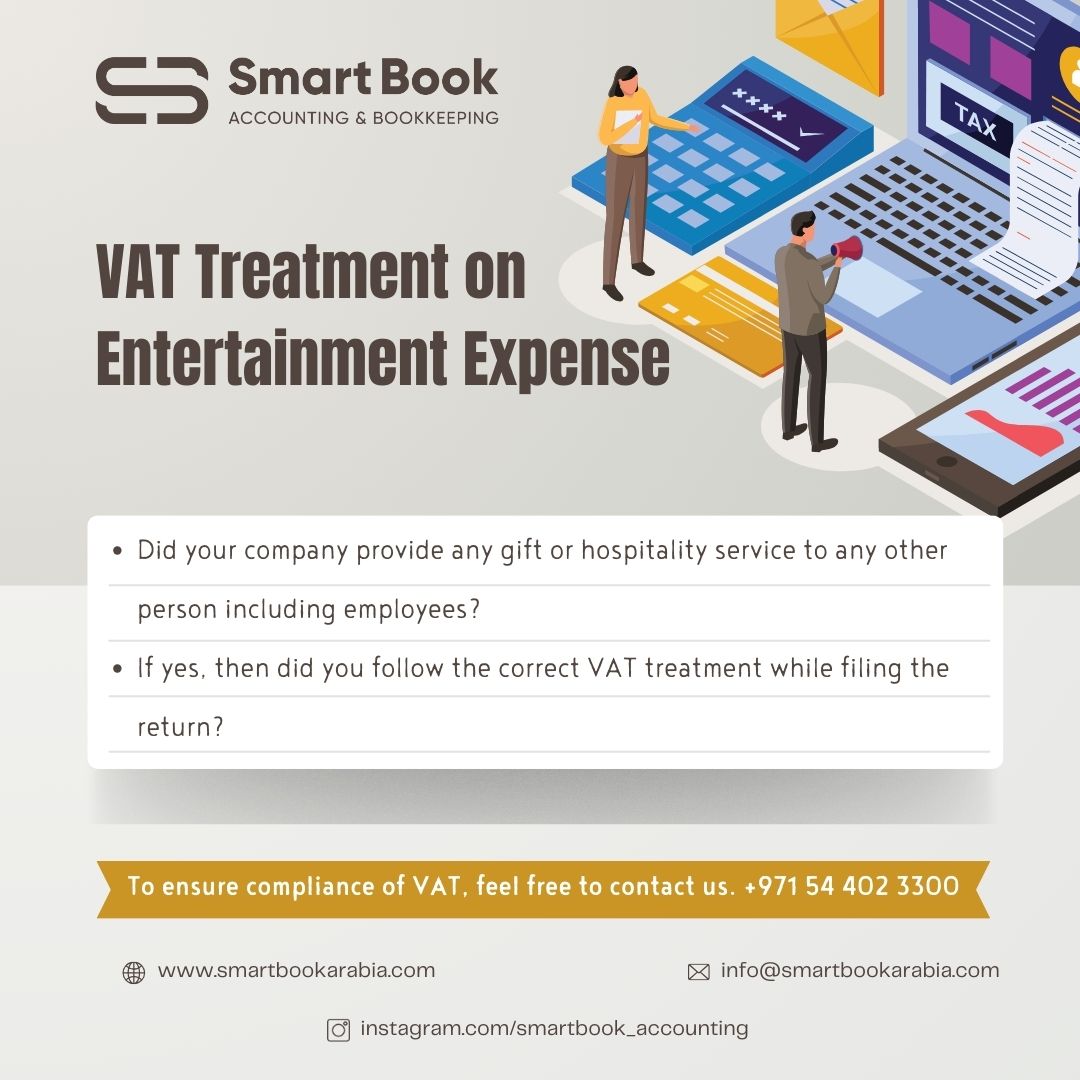Office No. M06, Mezzanine Floor, Alphamed Building, Abu Hail Road, Hor Al Anz East, Dubai, UAE.
LocationMuzhakkunnu, Muzhakkunnu PO, Peravoor Via, Kannur (Dist), Kerala, 670673.

Tax on Entertainment Expense
Entertainment is considered as hospitality of any kind and entertainment expenditure is the expense of providing entertainment. It is common to incur such costs for the entertainment, amusement or recreation of customers, shareholders, suppliers, or other business partners, such as hospitality at restaurants, cultural events, sporting events, hotel stays and similar trips. Entertainment expenditure usually serves to build relationships and promote the Business in a more informal or social setting. Entertainment expenditure includes expenditure in connection with meals (food and beverages), accommodation, transportation, admission fees, as well as facilities and equipment used in connection with such entertainment.
However, this type of expenditure often contains a private element that is provided for the enjoyment or hospitality of the recipients/guests that would prevent the expenditure from being wholly and exclusively incurred for Business purposes. Thus, a 50% deduction for entertainment expenditure is allowed for Corporate Tax purposes.
For Corporate Tax purposes, the accounting classification of a particular expense is not relevant when considering whether such an expense is entertainment expenditure.
Entertainment expenditure should be distinguished from expenditure incurred in relation to employees. Employment related expenditure will not fall under the ambit of entertainment expenditure and should be fully deductible, provided that it is incurred wholly and exclusively for the Taxable Person’s Business. Based on the above, expenditure reported in the Financial Statements that is incurred for employee/staff entertainment, such as staff parties, off-site events/away-days or rewards for meeting performance targets, are employee related expenses as opposed to entertainment expenses and can be fully deducted for Corporate Tax purposes.
However, if an expense is incurred for an event which is private in nature, such as a wedding for family members who happen to also be staff, it will not be deductible for Corporate Tax purposes. Where a Taxable Person organises conferences and/or business events for employees, their spouses and children (such as team building events or seasonal events), for which it incurs expenditure on catering, this expenditure will be deductible since it relates to the Business of the Taxable Person and is not meant for the entertainment of non-employees, provided that the expenditure is not excessive.
Any expense incurred which is incidental to a Business purpose (for example, food or drink provided during a Business meeting) shall not be considered as entertainment expenditure. Food and refreshments in an office setting would generally be considered as incidental and in connection with the Business and, hence, would be fully deductible. A further example of an incidental expense which would not be considered as entertainment expenditure would be where a retailer provides complimentary refreshments to prospective customers.
Expenditure incurred for Business purposes (other than for employees) on food and beverages at a venue such as a restaurant, whether or not accompanied by any other form of entertainment (for example, a live band) cannot be considered as incidental, and so would be entertainment expenditure subject to the 50% deduction rule.
Where a Taxable Person provides commercial hospitality as part of their Business or Business Activity, such expenditure would not be considered as entertainment expenditure. For example, where an airline provides a washbag or in-flight entertainment, or where hotels provide packaged or mid-week promotions, such expenditure would be considered as ordinary Business expenditure and notentertainment expenditure. However, where benefits are provided to clients and business partners that are not considered commercial hospitality or promotions, then such expenditure incurred would be considered as entertainment expenditure and would be subject to the 50% restriction (e.g. providing business partners with complimentary stays at hotels).
The 50% deduction rule does not apply to other marketing expenditure, such as advertising, online promotion, attending trade shows or direct marketing campaigns, which is deductible in line with the general principles of the Corporate Tax Law, subject to being wholly and exclusively incurred for Business purposes. Whether an item of expenditure can be considered as marketing expenditure or entertainment expenditure, will largely depend on the industry in which the Taxable Person operates.
Where marketing involves expenditure on the promotion of a Taxable Person’s goods or services, for example, demonstrating a car at a racetrack, the necessary costs of doing so will not be subject to the 50% restriction. However, (typically discretionary) costs of providing hospitality at the event such as meals, a musical performance or accommodation will be subject to the 50% restriction for entertainment expenditure.
Expenditure would not be subject to the 50% deduction rule, where it involves a Business advertising its own services or products by making them available to the general public at a reduced price or for free. This will also be the case where only certain individuals can benefit because they will generate publicity for the Business, such as a restaurant giving a free meal to a food critic, a spa providing free entry to an influencer, a trial run of hotel facilities provided to a potential bulk buyer of the product, etc.
As another example, a Taxable Person taking a group of clients to a sporting event and providing them with tickets, meals and drinks in a corporate box will be treated as entertainment expenditure. Hence, only 50% would be treated as deductible for Corporate Tax purposes, whereas a Taxable Person purchasing a booth at a trade show to display the company’s new product line would be treated as sales/marketing expenditure for running the Business and, hence, deductible for Corporate Tax purposes.
Sponsorship costs (for example, sponsoring an event) will be deductible where such costs are incurred for marketing purposes. However, to the extent that benefits are received as part of that sponsorship (for example, tickets to a sporting event) and the benefits are used to entertain business partners and/or customers, then the value of these benefits will be considered as entertainment expenditure and will be subject to the 50% deduction.




.png)
